Pioneer physician Dr. A.D. Brickler was 'a guiding light' to generations
Tallahassee has lost one of its greatest physicians in the passing of Dr. Alexander Dumas "A.D." Brickler, a man whose reach can't be easily measured.
He passed away in the early morning hours Oct. 30, surrounded by family. Brickler suffered a heart attack in January. He'd been a marathon runner in his prime, which most likely prolonged his life after the heart attack. He died at age 94.
Brickler lived to serve.
By age 90, he'd delivered more than 30,000 babies over the course of his storied 60-year career before his retirement four years ago at Tallahassee Memorial HealthCare, where the woman's pavilion bears his name in tribute.
He was a legend, to many, although he didn't lean into such labels. He chose the path of humility over hubris.
Brickler often entered a delivery room the same way, standing in the back of the room with his hands crossed behind his slim frame. Listening and watching. He was always calm amid the chaos and often emotional moments of bringing new life into the world. He was the same in high-risk deliveries where the mother and baby's life hung in the balance.
It didn't matter if someone was rich or dirt poor, those who worked with him said he treated everyone the same.
"If there was ever a guiding light or lamp post or somebody that you could use as a role model, it was him," said Dr. Alexander "A.J." Brickler III, who followed in his father's footsteps and became an obstetrician. "I think one thing that I would say about him, probably more than anything, is that he was a giver. He could sense or see, whenever he was talking to somebody, what they needed."
A doctor's doctor
A.D. Brickler educated more than 330 residents who graduated from TMH's Family Medicine Residency Program since it first launched in 1971.
Dr. Michael Degnan was one of them. He trained at TMH, where obstetrics was part of the residency, and Brickler assisted residents with vaginal and Cesarean section deliveries.
"Dr. Brickler was the kindest, smartest, most humble medical person and medical teacher I've ever met to this day," Degnan said, who now lives in Haines City. "I think he embodied what everybody should strive for in medicine. He cared solely for the patient."
He later learned that first hand when his wife was pregnant with their second child. Degman said A.J. Brickler was his wife's obstetrician. When labor pains crept in, the younger Brickler was out of town and likely wouldn't be able to return in time to deliver the baby.
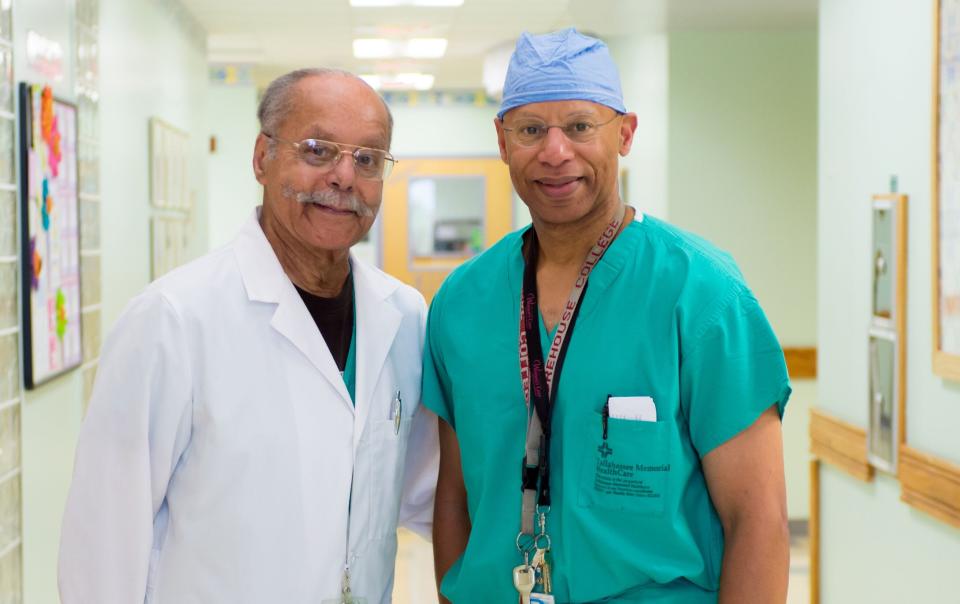
The elder Brickler was on call and stepped in. Turns out the younger Brickler made it in time, but the elder doctor never left the couple's side. He pulled up a rocking chair inside the delivery room and stayed.
"That has always touched my soul, because he's seen a million deliveries," Degnan said. "But, he was so kind to us and just wanted to be there to see our delivery."
Degnan and his wife decided the newborn's middle name would be "Alexander," named for both Bricklers.
"When I would be with the younger Brickler, I'd say, 'Well, we named him for you.' And then when I was with the older Brickler, I said, 'Well, we named him for you.' They saw through it," said Degnan, adding it became a standing joke. "I've met all kinds of physicians, great physicians. I can't think of anyone that I admired more in my training than Dr. (A.D.) Brickler."
Breaking barriers, delivering babies
As a young man, Brickler excelled in math and science yet he only first considered medicine after a college mentor suggested it.
The interest was "almost an accident," said Brickler, in a previous statement provided by TMH during the pavilion dedication. "My major was physics and my minor was math – I had planned to use those subjects as my life’s work because I enjoyed them so much, but my major professor said, ‘Why don’t you take the MCAT?’”
His high test scores on the Medical College Admission Test allowed him to be part of the 1950 class of Meharry Medical College at a time few Black students were admitted.
He completed his residency training as a military physician at Lockbourne Air Force Base Hospital in Columbus, Ohio. Later, he created a private practice in Long Branch, New Jersey.
In 1957, he joined forces with Dr. R.L. Anderson, his father-in-law, who asked him to relocate to Tallahassee. Back then, specialists were hard to come by. Primary care was in high demand and the two opened a clinic: the Anderson-Brickler Midwifery & Obstetrical Services.
The same year, he began working at Florida A&M University Hospital, the only place in town Black residents could go for medical care. The hospital is now the Foote-Hilyer Administration Building on campus.
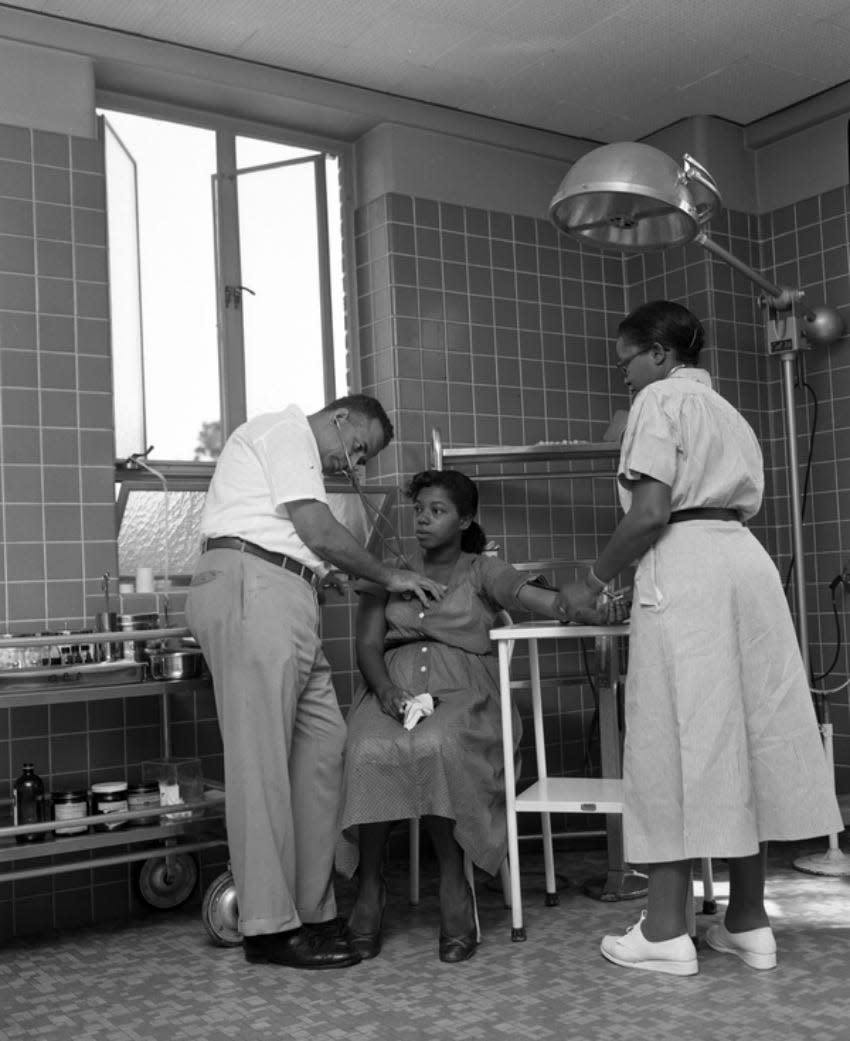
Sally Karioth, a longtime faculty member at Florida State's College of Nursing, worked with Anderson and Brickler in the earlier part of her teaching career in 1969. Anderson and Brickler saw not only Black patients but also low-income patients, too.
"He was always graceful and elegant and compassionate in his care," Karioth recalled.
One day, in 1970, while shepherding some of her nursing students at the FAMU hospital, Karioth witnessed a miracle. A pregnant woman came to Brickler's clinic on South Adams Street for a check up and ended up going into labor outside. She gave birth to her tiny son, no more than 2 pounds.
Brickler scooped the preemie baby off the grassy lawn and into his hands, burst through the doors of FAMU's hospital. He began instructing everyone on what was needed. Karioth remembers the baby, a feisty one who kicked the inside of his incubator — fighting for his life.
"That kid never should have lived," said Karioth, adding that Brickler later invited her to witness the boy's college graduation ceremony 20 years later. "(Brickler) saved his little life."
Every day, miracles took shape, even while trying to provide care in the Jim Crow South in an under-funded hospital. Brickler, a descendent of Harriet Tubman, pushed for change in his own way.
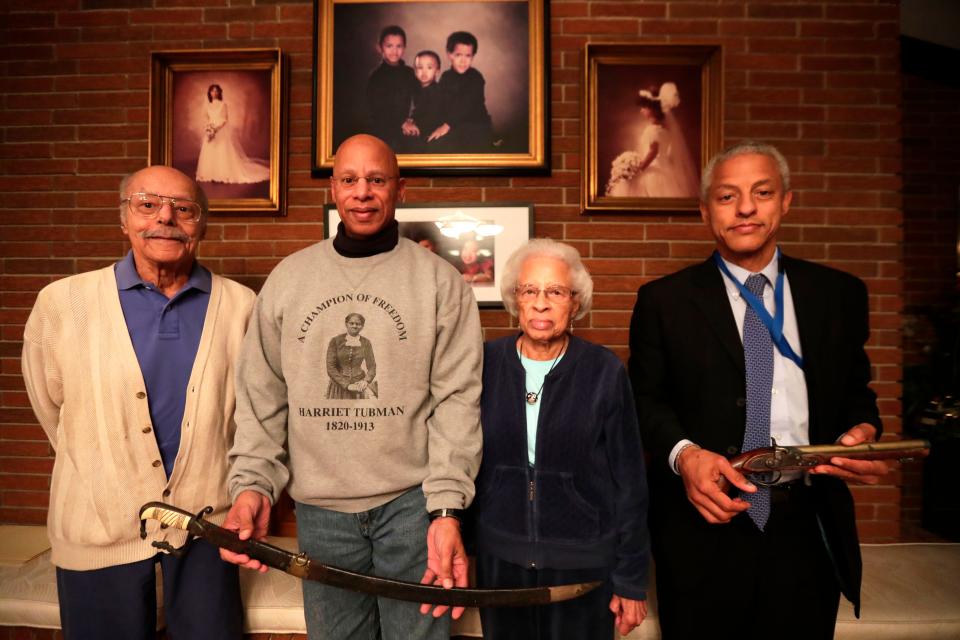
But change, fanned by racial tension, crackled and grew louder as more calls for equality became more frequent. The Civil Rights Era cultivated impassioned organizers and religious leaders, including Tallahassee icon Rev. C.K. Steele, who turned to Brickler to deliver his children.
A decade into delivering Black babies, Brickler found himself sitting at the table with M.T. Mustian, then president and CEO at TMH, formerly named Tallahassee Memorial Hospital.
In an interview with the Democrat during his retirement, Brickler said desegregation was inevitable and he considered Mustian to be open-minded.
“The problem was to desegregate without getting into a lot of problems with the community. And the white community was, of course, opposed to it," he said.
So Brickler suggested a baby step — inclusion at FAMU Hospital. The hospital began to take in indigent residents, including poor white women.
“When the word began to spread throughout the community, the opposition to integrate TMH began to diminish, and we got it done without a whole lot of calamity,” he said.
The FAMU Hospital merged with TMH in 1971. Brickler and Dr. Anderson joined the Tallahassee Memorial medical staff and helped lead the transition and the integration of staff.
Countless stories of love, impact and care
Brickler was known for handling tough times with grace. It didn't matter if it was in the delivery or operating room, his approach made him beloved.
Dr. Tanya Evers, an OBGYN at TMH, remembers learning from Brickler as a medical student at FSU.
"People would talk about the legend that was Dr. A.D. Brickler so it was exciting to be able to watch him deliver babies and perform C-sections," Evers said. "Then returning to Tallahassee, joining the faculty and being able to work alongside him was really even better."
He offered a compassionate blueprint to patient care that's influenced generations of medical professionals, including nurses and midwifes who feel blessed to have worked alongside him.
"He also took care of very ill women and he trusted and depended on midwives to be his eyes, in rural areas where there were no other options," said Miriam Gurniak, a midwife who works throughout North Florida. "He totally respected us and worked seamlessly with us."
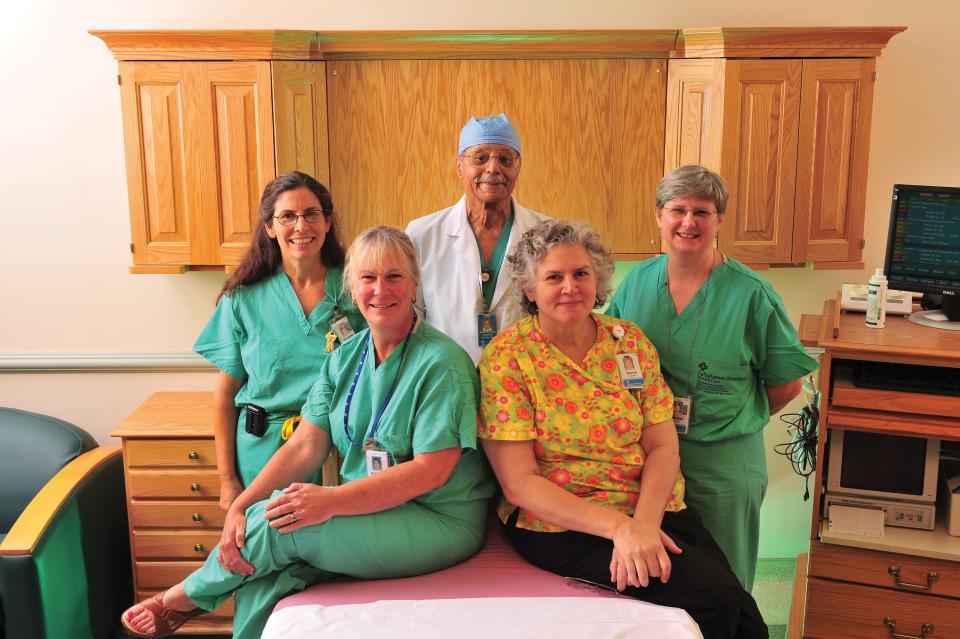
She said one of the proudest moments of her life was to be a "Brickler midwife.""
"There are 30,000 people who are Brickler babies, but to be a Brickler midwife, it is an indescribable honor."
Storied obstetrician: 30,000 babies and 60 years later, Dr. A.D. Brickler delivers last bundle of joy in Tallahassee
Stacy Marcelle-Palmer, a registered nurse at TMH, marveled at how calm Brickler would be in every situation. She learned from him the power of being calm and bringing that power into the delivery room.
"I have this thing I do when somebody's losing it during a delivery, I'll get right in their ear and whisper because they can't hear what I'm saying if they're still screaming," she said. "I'll say, 'You have to be quiet to hear what I'm telling you to help you."
She learned that from watching Brickler in action.
"That's the kind of person I want to be," she said. "I want to walk into a room and bring some calm, not some chaos."
A husband, father and father figure to many
Brickler, a married father of four, loved life and people. He wasn't gregarious but had a way of bringing laughter and levity to every room he entered, when appropriate.
He was the father to a generation of doctors. He was the ultimate role model to his four children, two of whom are keeping his medical legacy alive through their work.
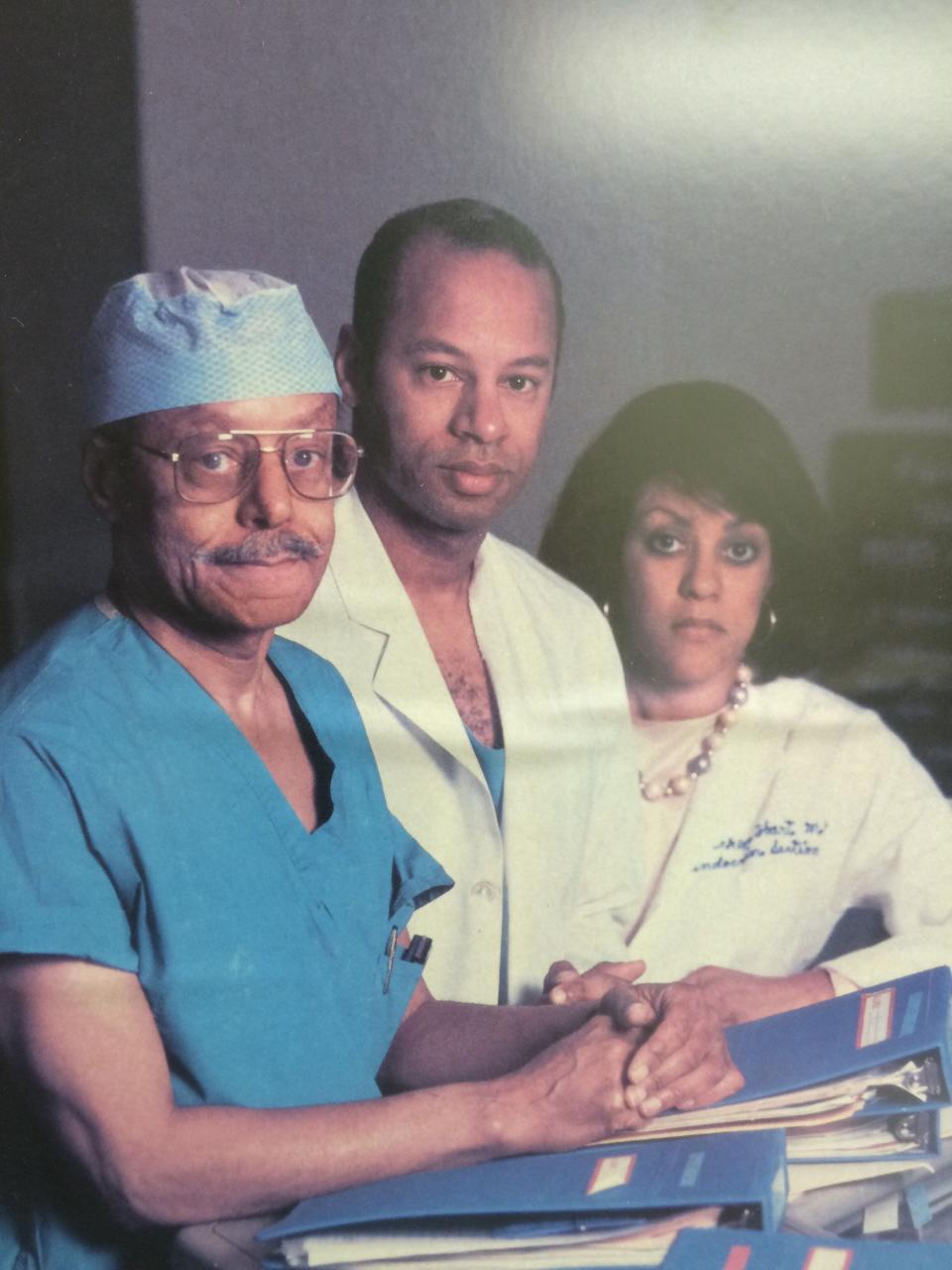
His daughter, Dr. Celeste Brickler Hart, still operates her private practice where Brickler and Anderson cared for so many at their clinic.
"I think the most important thing he would say is he would want to be remembered as a caring individual who cared after others, regardless of race, creed, color," Brickler said. "He really was a human and loved humanity."
After his dad's passing, the younger Brickler won't be sad going to the women's pavilion. Brickler said he'll look at his dad's name in giant letters on the wall and see only one thing: inspiration.
Comments from residents and medical professionals regarding Dr. A.D. Brickler
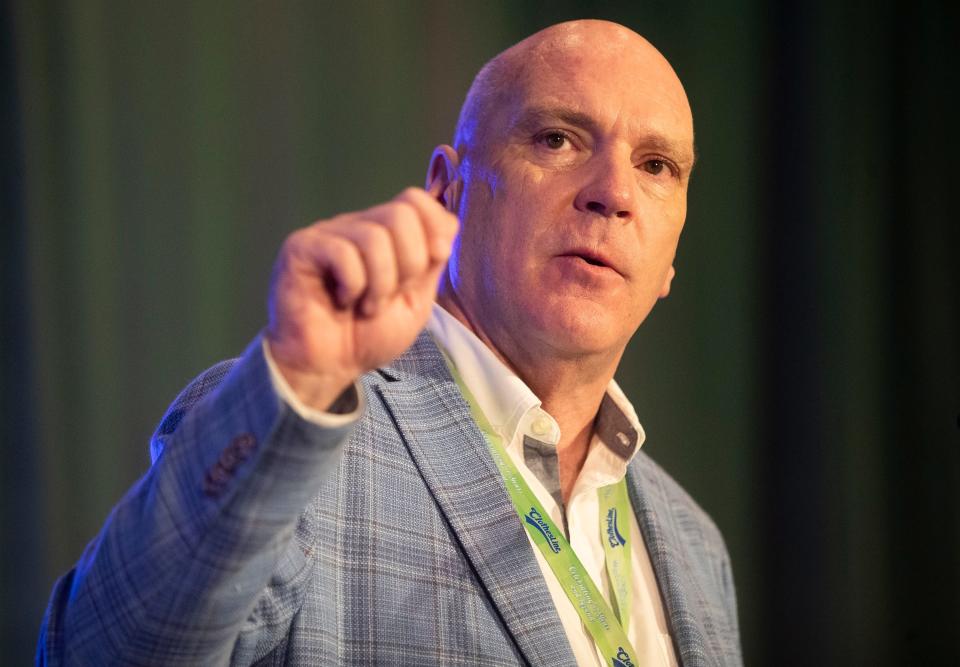
“He was one of the most incredible men I’ve ever met. Whenever I was in his presence, I felt like I was in the presence of greatness. When you listen to his stories and learn about how he approached life and how he changed people and people’s opinions of how to work across races, different sectors of society, the man was a pioneer. He was a steady change agent. He was just incredible. It's a badge of honor to be one of the babies he delivered. There’s a lot of pride in our community that comes with saying, ‘I’m a Brickler baby.’ He never saw himself as the hero, but he was a hero.” — Mark O'Bryant, President and CEO at Tallahassee Memorial HealthCare
"I’m so sorry to hear of his passing. My son was born 9 weeks early on New Year’s Day 2017. I drove myself to the ER at midnight the day before. I didn’t know Dr. Brickler before then, but he was on rounds that day. I will never forget him sitting in a rocking chair in my hospital room at 6 AM, (jokingly) yelling 'you did what?! Do you know how lucky you are you didn’t stroke out on your bathroom floor?!' He was a wonderful doctor who cared for his patients and always told them the truth." — Sarah Young, professor public administration at Kennesaw State University
"He WAS/IS Black History in Tallahassee. His legacy of providing medical services to Black people in Tallahassee during segregation is legendary. And his medical legacy to this city – a son and daughter who also are physicians providing medical services to the people of this city – Black, white, Hispanic, all colors and races – without prejudice – continues to show his path of Importance IN and TO this city. If his medical path was a road in this city, it would start on the Southside and wind its way thru practically EVERY neighborhood. And then take-off to places all over this world in the form of the paths of the thousands of mothers and babies he delivered and cared for." — Priscilla Hawkins, community activist
"Dr Brickler was not my OB, but he trained my primary care doctor who delivered my two children and both times he happened to be in labor and delivery when I needed him! Both times my doctor needed help and he was my ANGEL. I wrote him two thank you notes (this was 1999 and 2002) which I hope he read ... He was a lovely human. And when he looked in my face and patted my hand and said, “you’re going to be all right,” I knew he was in control. I’ll always remember him." — Brandy Luce, Tallahassee resident whose children were delivered by Dr. Brickler.
"I just loved him. I enjoy coming to his appointments because it's very encouraging. He never talked negative or anything, and he was always concerned about whatever problems or concerns that I had." — Willard Ward, former patient and mother of Charlie Ward Jr.
"He delivered me on May 30, 1979, and was my pediatrician for many years. My mother was 17 years old when I was born. Later while attending Florida State University, I worked at Tallahassee Memorial (HealthCare) and would often see Dr. Brickler in passing as I transported patients to radiology procedures or facilitated intravenous lab draws as a phlebotomist. I left home to pursue my career ambitions in California and have been here 22 years. I carry many of the attributes I experienced as a patient of Dr. Brickler with my current patients and clients I serve in Health and Wellness. Dr. Brickler’s reach is global." — Myisha Jones, former patient
"He, of course, helped train me when I was a resident and later worked for me when I became residency director at TMH. Beyond that, he helped trained hundreds of family medicine residents here in Tallahassee but also helped train hundreds of our medical students here at the FSU College of Medicine. We honored him with an Honorary Professor Emeritus award based on his many years of service to us."
Dr. Alma B. Littles, interim dean at the FSU College of Medicine
Contact Reporter TaMaryn Waters at [email protected]. Follow @TaMarynWaters on X.
This article originally appeared on Tallahassee Democrat: Dr. A.D. Brickler dies, leaving behind long legacy in Tallahassee
